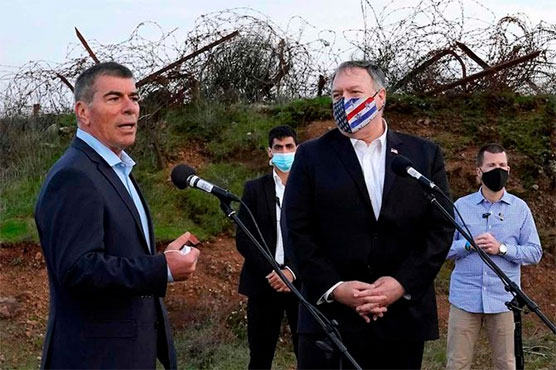Syria condemns 'provocative' Pompeo visit to Golan Heights

Syria condemned what it called a "provocative" visit by Pompeo to the disputed Golan Heights.
DAMASCUS (AFP) - The Syrian government on Thursday condemned what it called a "provocative" visit by Mike Pompeo to the disputed Golan Heights, the first such visit by a US secretary of state.
"Pompeo s visit is a provocative step before the end of the Trump administration s term, and a flagrant violation of the sovereignty of the Syrian Arab Republic," said a foreign ministry statement, carried by state news agency SANA.
"Syria affirms that such criminal visits encourage (Israel) to continue its dangerous hostile approach."
Israel seized the Golan Hights from Syria in the 1967 Six-Day War.
Last year, Trump s administration controversially recognised Israeli sovereignty in the Golan, and Pompeo on Thursday condemned what he described as calls from "the salons in Europe and in the elite institutions in America" for Israel to return the Golan to Syria.
"Imagine with (Syrian President Bashar) al-Assad in control of this place, the risk of the harm to the West and to Israel," Pompeo said.
Earlier, US Secretary of State Mike Pompeo on Thursday became the first American top diplomat to visit the Israel-occupied Golan Heights after an unprecedented stop in a West Bank Jewish settlement that infuriated Palestinians.
The envoy of US President Donald Trump, who has made a staunchly pro-Israel stance a hallmark of his turbulent term in power, also called the anti-Israel BDS boycott movement a "cancer" that Washington would designate as anti-Semitic.
Under heavy security and alongside Israeli Foreign Minister Gabi Ashkenazi aboard a Blackhawk helicopter, Pompeo visited the disputed Golan Heights, a strategic territory the Jewish state seized from Syria in the 1967 Six-Day War.
"You can t stand here and stare out at what s across the border and deny the central thing that President Donald Trump recognised... This is a part of Israel," Pompeo said.
Last year, Trump s administration controversially recognised Israeli sovereignty in the Golan, and Pompeo on Thursday condemned what he described as calls from "the salons in Europe and in the elite institutions in America" for Israel to return the Golan to Syria.
"Imagine with (Syrian President Bashar) al-Assad in control of this place, the risk of the harm to the West and to Israel," Pompeo said.
Pompeo earlier announced a new pro-Israel policy, stating that Washington would designate as "anti-Semitic" the BDS or Boycott, Divestment and Sanctions campaign, which calls for a wide-ranging embargo against Israel over its treatment of the Palestinians.
"We will immediately take steps to identify organisations that engage in hateful BDS conduct and withdraw US government support for such groups," Pompeo said after meeting close ally Israeli Prime Minister Benjamin Netanyahu.
"We want to stand with all other nations that recognise the BDS movement for the cancer that it is."
Israel sees BDS as a strategic threat and has long accused it of anti-Semitism, and a law passed in 2017 allows it to ban foreigners with links to the movement.
Activists strongly deny the charge, comparing the embargo to the economic isolation that helped bring down apartheid in South Africa.
Condemning Pompeo s announcement, Human Rights Watch said "the Trump administration has no business trying to tar groups because they back boycotts," which it said had been used to advance social justice throughout American history.
Amnesty International called BDS a "form of non-violent advocacy and of free expression that must be protected".
Pompeo -- who has so far backed Trump in refusing to concede defeat to President-elect Joe Biden -- is on what could be his final Europe and Middle East tour in the post.
Netanyahu, who has congratulated Biden, thanked Pompeo for his "unwavering support" of Israel, first as CIA director and later secretary of state.
Pompeo had no meetings with Palestinian leaders, who have strongly rejected Trump s stance on the decades-old conflict, including Washington s recognition of Jerusalem as the Israeli capital.
The secretary of state Thursday also became the first US top diplomat to visit a Jewish settlement in the occupied West Bank, where the Psagot winery has named one of its red blends after him.
On the way there, he stopped at Qasr el Yahud, revered as the site of the baptism of Jesus in the Jordan Valley.
Pompeo said a year ago that the United States no longer considers Israeli settlements in the West Bank to be contrary to international law.
He took a further step Thursday, announcing that the US would now consider exports from much of the West Bank as Israeli.
He said the new guidelines apply especially to Area C, the large part of the West Bank where Israel retains full civil and military control and where much of the settler population lives.
Area C also includes the strategic Jordan Valley and many Palestinian communities, areas that Israel considers to be disputed.
Pompeo s announcement seemed to imply that even Palestinian exports from Area C should be tagged as Israeli products -- as should the wine he sampled at Psagot.
Regarding products from areas under Palestinian control, they must now be marked as coming from the West Bank or Gaza, the coastal enclave controlled by the Hamas Islamist group.
That decision effectively means that, at least through Trump s remaining days in office, the US will not recognise exports as coming from the Palestinian Territories.
The Palestinians condemned Pompeo s unprecedented settlement visit and Washington s decision on labelling exports.
"The decision blatantly violates international law," said Nabil Abu Rudeineh, a spokesman for Palestinian president Mahmud Abbas, dismissing it as yet another biased move by Trump s administration.

